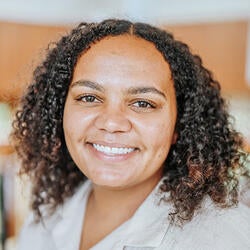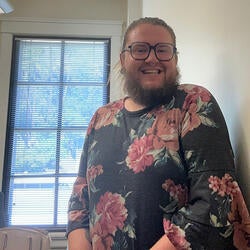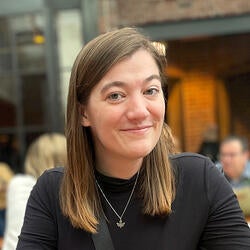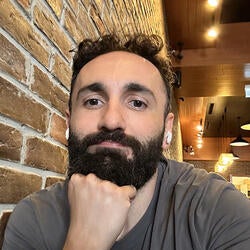Holstein Dissertation Fellows 2024-2025
|
Michelle Bostic (they/them) is a PhD Candidate at the University of Virginia in Religious Ethics. Their work lies at the intersections of black religious ethics, black geographies, and queer and trans studies. In their dissertation, they create a spatial framework to examine ethical problems with housing/home, family, and gender under racial capitalism. They hold a Master’s in Public Health focusing on health, law, and ethics from the University of Virginia and a Master of Divinity from Princeton Theological Seminary. They also have a background in homeless case management, crisis de-escalation, and organizing around abolition, labor, and housing. Mentor: El/yse Ambrose |
|
|
J Selke is a PhD Candidate in the Department for the Study of Religion at the University of California, Riverside. Their areas of specialization are in U.S.-based Religion, New Religious Movements, and Queer and Trans Studies in Religion. Their research investigates contemporary and historical popular manifestations of the Satanic figure in Satanism, Occultism, and Witchcraft through a transgender lens. J's dissertation project examines mediatization and the politics of visibility through the transing and de-transing of various historical Satanic figures within contemporary television and film, most notably the Baphomet, Lilith, Lucifer, and Beelzebub. Mentor: Rudy Busto |
|
|
Lake Stein is an indecent theologian and a doctoral candidate in systematic theology at Fordham University. Lake also works as a teaching associate at Fordham University, Lincoln Center. Lake deals with economic theologies, lament, liberation, emergent strategies, religious diasporas, poor subjectivities, subalternity, and transsexual reality. Lake’s current work is interested in the legacy of 20th-century political theology as a critique of bourgeois religion. Lake’s work is both concerned about this project’s limitations for reconstructing the subject of a postcolonial, trans-theological anthropology and is dedicated to the demanding, interruptive logics of this critique’s practical and prophetic mysticism. Facing the material and structural challenges posed by the category of the normative of both colonial liberalism and Catholic systematic theology, Lake incorporates continental philosophies of hermeneutics, psychoanalysis, and feminist critical theories in order to stage a convergence of paradigmatic theologies of guilt and innocence. Mentor: Xochitl Alvizo |
|
|
Megan Wines is a Ph.D. Candidate in New Testament and Early Christianity at Loyola University Chicago. Her dissertation explores the relationship between apocalypse, masculinity, and performance, arguing that there is a particular type of “apocalyptic masculinity” that can be examined in the biblical and extrabiblical texts. The work takes an interdisciplinary approach, combining insights not only from biblical studies, but also from gender studies, performance studies, and queer studies as it looks at the fluidity of masculinities present in the apocalypses. Outside of her dissertation, she is also interested in the plethora of ways “religion” shows up in popular media and popular culture and has presented works on pop culture items like Jesus Christ Superstar, Doctor Who, and Daredevil. In addition to her academic work, she is a theatre artist who works as a lighting designer in the Chicago theatre community. Mentor: Peter Mena |
|
|
Ali Yıldırım is a Ph.D. candidate in the Gender, Women, and Sexuality Studies Department at the University of Minnesota. Before joining UMN, he worked as a teaching assistant at Istanbul Bilgi University for five years. He holds a master's degree in Cultural Studies from the same university. Driven by his personal stories, Ali focused on the experiences of Alevi LGBTQ people in Istanbul in his master's research. In this study, Ali critiques the heteronormative readings of "minority" existence with first-hand ethnographic knowledge from within the Alevi communities. Expanding on his master's research, Ali continues to research the Alevi everyday and its intersection with gender, sexuality, queer/transness, religiosity, and power. In doing so, his dissertation examines the entangled relationship between sexualized discourses and sectarianism in the ethno-religious nationalism of the Turkish state and the ways Mentor: Şahin Açıkgöz |




